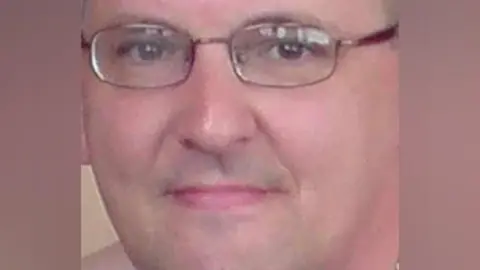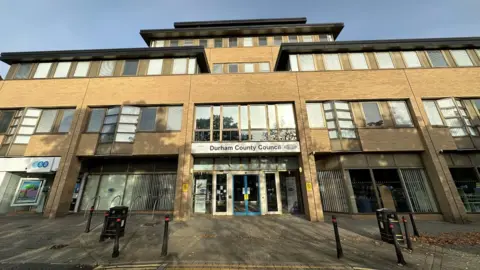David Stevens' death: Coroner finds missed opportunities
 BBC
BBCA mental health trust "missed opportunities" to help a man before his suicide but failures did not definitely cause his death, a coroner has found.
David Stevens, 57, was found dead at his home in Willington on 15 June 2022 five months after he first spoke to the Tees, Esk and Wear Valley NHS Trust.
He was deemed low-risk but no-one took a "helicopter view" of his multiple calls to trust teams, County Durham assistant coroner Janine Richards said.
The trust admitted failings.
Mr Stevens' sister Keely Card said the family was "very distressed" that he was "not listened to when he sought help" and he had been "massively let down" by the trust.
His brother Kevin Stevens said he believed Mr Stevens would still be alive today if he had been given the help he needed, adding there were "systemic failures" which the family found "very disturbing".
Ms Richards said there were "missed opportunities" to reassess or escalate Mr Stevens' treatment plan but it was "not known if those would have prevented his death".
The inquest in Crook heard the father-of-three, who worked escorting disabled children to school in taxis, had a history of depression and paranoid personality disorder when he was referred to the trust's access team in January 2022.
The access team offered support through "low-level" interventions such as talking therapy and teaching techniques for coping with ruminating thought to people deemed to be at low risk of suicide and self harm.

The coroner heard Mr Stevens had extreme anxiety rooted in problems he had had with "internet scammers", social media and relationship troubles, struggled to sleep and reported hearing voices, but was assessed to be appropriate for the access team to treat.
- You can find information and support on the BBC's Action Line
He met an access team clinician in Bishop Auckland in May and was happy with the offer of four sessions, with a first full session scheduled for 21 June.
But that clinician didn't know he was also making multiple calls to the trust's Durham and Darlington crisis team raising concerns about his medications, an inability to sleep and extreme anxiety, as well as twice attending a hospital's A&E department after expressing suicidal thoughts.
Lynn Lewendon, who carried out a serious incident review after his death, said while on each occasion his immediate needs were met and he received "reassurance", no-one took a "helicopter view" to see if his treatment and risk should be escalated.
'Fed up'
She also criticised the 21-week wait he faced for his access treatment to start and said if he had been given techniques to manage his anxiety earlier, the outcome could have been different, and there were calls he made which should have seen his care escalated to a more intensive plan.
Mr Stevens was treated at the University Hospital of North Durham for an overdose of his anti-depressants on 13 June, but was sent home after saying he was "very regretful" and did not want to die.
His GP, Dr Hannah Cowell, said she spoke to him by phone on 14 June and he was his normal "chatty" self, adding he admitted he had felt "fed up" but "reassured" her he had "no thoughts to end his life".
He was found hanged at his home on 15 June after concerned neighbours were unable to contact him.
The inquest heard failures in the crisis team, which was in special measures and facing overwhelming demand and understaffing at the time, had been identified in November 2021 after four deaths and were still relevant in Mr Stevens' case.
Ms Richards said Mr Stevens had been "seeking help" for his "increasing level of anxiety" and he was still waiting for the "structured and planned treatment" he needed at the time of his death.
"It's impossible for me to know if David had been able to access more appropriate treatment whether this would have been successful in helping him manage his overwhelming anxiety," Ms Richards said.
'Changes needed'
She said: "Although a level of disfunction was identified and many of those issues were known to the trust, I do not find the trust knowingly denied life-saving treatment.
"Each time David was seen it was believed by practitioners the acute risks had passed and David confirmed thoughts of suicide and self harm were not on-going."
She said it was "possible" Mr Stevens could have survived but she could not say he "would have" done.
The coroner recorded a finding of suicide.
Beverley Murphy, chief nurse at the trust, said staff had been "open and transparent" during the inquest about the "changes we needed to make" but the coroner recognised improvements had been made to which the trust remained committed.
She said: "Our thoughts are with David's family during this time and we remain deeply sorry for their loss."

Follow BBC North East & Cumbria on X (formerly Twitter), Facebook and Instagram. Send your story ideas to northeastandcumbria@bbc.co.uk.